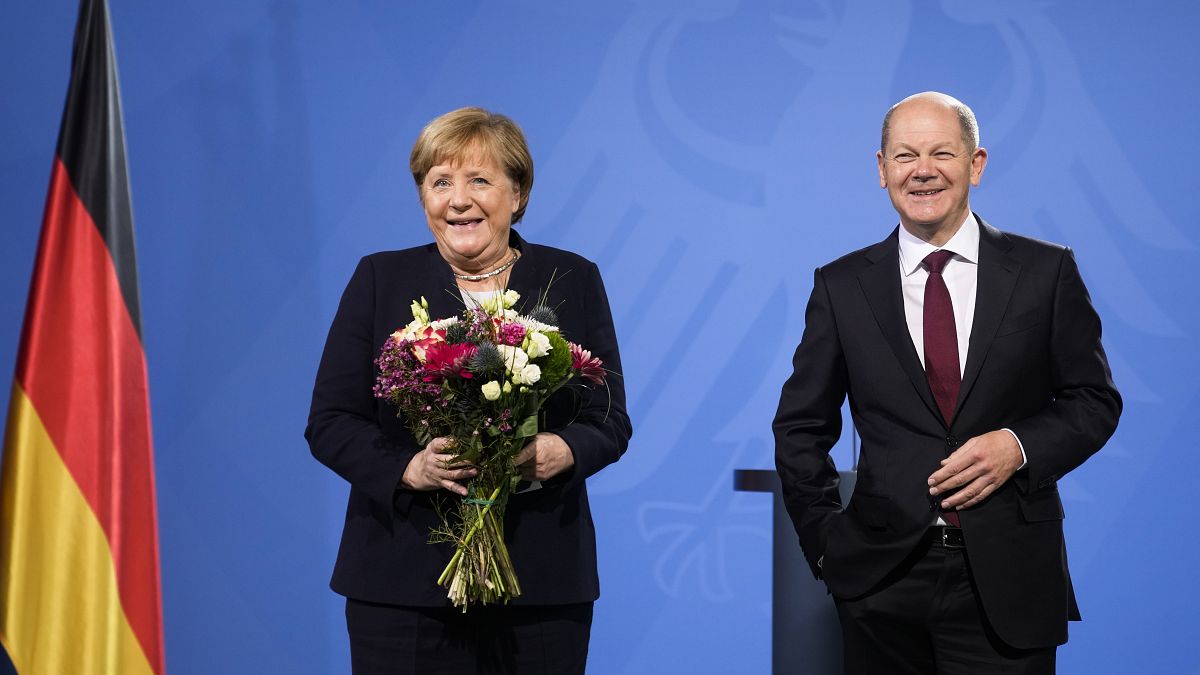"Dramatic clashes inside the coalition about the direction of Germany’s foreign policy will be inevitable," writes Jacob F. Kirkegaard.
The new German government is full of contrasts.
Made up of a political mix of social democrats, greens and liberals, it marks a clear break from Angela Merkel’s increasingly cosy Grand Coalitions. Yet, with previous finance minister Olaf Scholz now appointed Federal Chancellor, Germany nonetheless has continuity at the top.
The government has an ambitious and progressive programme for Germany which, if successfully implemented, will dramatically change the country and the European Union along the way.
For only the eighth time since the founding of the EU in 1957, a new German chancellor has taken office. Olaf Scholz leads the first three-party coalition to govern Germany as a member state. This shift from two to three-party arrangements in Berlin reflects the same erosion of the established large volkspartien already seen in many other European countries.
Multi-party coalitions are inherently less stable than governments with only one or two groups, making Scholz’s domestic political power base weaker than that enjoyed by prior German leaders. He is hence less likely to serve as chancellor for as long as, for instance, Angela Merkel did, and may not acquire the additional European gravitas and longevity in office bestowed upon his predecessors. Scholz will struggle to replicate Angela Merkel’s recent political dominance in the European Council.
But, at the same time, Scholz, as a social democrat leader, enters the Chancellery at a fairly favourable time, when the centre-right European People's Party (EPP), the traditionally preeminent political group in EU politics, is a hollow shell of its former self.
Derived now of the national leadership in all major member states, the EPP is fighting to maintain the control over the EU policy process that it has enjoyed in recent decades.
Instead, Scholz, together with fellow socialist Pedro Sánchez in Spain and fiscally activist leaders in both France and Italy, sit at the end of the table in the main capitals.
The next 18 months will see key negotiations in Brussels around, among other topics, the reform of fiscal rules (officially, the Stability and Growth Pact), the long-term viability of the EU's €750-billion recovery fund (Next Generation EU) and the huge investment needs to decarbonise and digitalise the whole economy. All this offers Olaf Scholz a rare opportunity to set the EU agenda for the long haul alongside what appears to be – on paper, at least – like-minded European leaders.
Furthermore, Scholz becomes German chancellor at a time when the EU – as usual – is looking for German leadership, even if today the challenges the bloc faces are very different from the internal financial and migration crises so common in the Merkel era.
Now, Germany and the EU confront elevated external threats from an increasingly belligerent Russia, a rising China and a United States ever keener on mobilising its political and military resources in Asia. This state of play will require a new kind of political leadership from Scholz and an end to Germany’s long tradition of alleging "historical reasons" to simply focus on exports and evade engaging in thorny political and military disputes around the world.
Given the very different global visions inside the SPD, a party containing a powerful pro-Russia faction, compared to both the Greens and the FDP, for whom human rights, democracy and environmental issues play a far larger role, dramatic clashes inside the coalition about the direction of Germany’s foreign policy will be inevitable. Keeping the three parties together on various international crises may prove to be Scholz’s biggest political headache as chancellor.
Domestically, the new German coalition – comprising of Social democrats, who campaigned mostly on social issues such as higher minimum wages and pensions; the Greens, who pushed for more ambitious climate investments; and the liberals, always eager to prevent higher taxes and larger deficits – must transcend the traditional economic policy fissures.
A traffic light coalition simply cannot, just because of its membership, become a traditional free market and trade liberalising government, nor one that pursues a conventional 20th-century left-wing desire for more state intervention.
By contrast, Scholz must preside over an executive that will boost the financial and lending capacity of key German public companies, such as the KfW development bank, enabling him to leverage public money outside the regular debt brake. Combined with technical changes to how the debt brake is implemented, and its continued pandemic-era suspension throughout 2022, the cabinet will manage to find the necessary extra resources for its ambitious goals on climate, digitalisation and social policy.
This fresh financing will not be done in the original austere spirit of the German debt brake and is certain to invite legal challenges at the Constitutional Court. Yet, it reflects a new political and economic reality and shows Olaf Scholz’s Germany has definitely moved on from the Great Recession. The industrial powerhouse has today different needs and fiscal capabilities to deal with a European economy at risk of falling into a Japanese-style era of permanent stagnation and low-interest rates.
It seems clear that such a domestic fiscal volte-face in Germany, even if legal inside the existing debt brake, will entail at least some loosening effect on parallel negotiations around the EU fiscal rules.
This may very well be what Olaf Scholz had intended in the first place: to change Europe as he changes Germany.
Jacob F. Kirkegaard is a senior fellow at the Peterson Institute For International Economics (PIIE) and the German Marshall Fund (GMF).
